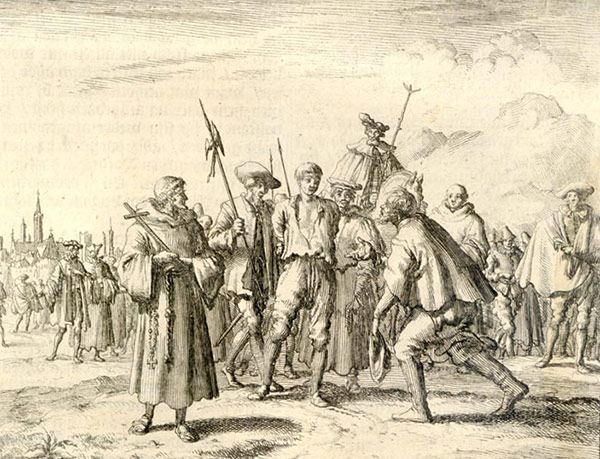Subtotal: $
Checkout
The Apostles on Nonviolence
“Love has precedence among Christians, but in the world the sword has precedence.”
By Peter Walpot
September 7, 2023
In the 1570s the Anabaptists known as Hutterites compiled The Great Article Book, a summarization of five main points of theology. The fourth article addresses the relationship of church and state; in this excerpt, the author provides commentary on verses from various apostles of the New Testament. The full fourth article can be found in The Christian and the Sword.
“Would you have no fear of him who is in authority? Then do what is good, and you will receive his approval, for he is God’s servant for your good. But if you do wrong, be afraid (Job 19:29), for he does not bear the sword in vain; he is the servant of God to execute his wrath on the wrongdoer. Therefore one must be subject” (note that he speaks simply of being subject, not of being lords, governors, mayors and rulers) “not only to avoid wrath but also for conscience’ sake. For the same reason you also pay taxes” (that is to their office) “on land and possessions, such as interest, taxes and tithes,” because they cannot perform labor but must attend to their office (Rom. 13:3–6).
Just as God has ordained that the ministers of the Word and gospel in Christendom should be supported by the gospel and receive the dues for their office and service from the church, so God has also ordained that the worldly rulers receive their dues from their subjects so that they can be supported and carry out their office. “For they are God’s servants attending to these things” (that is, preserving worldly peace and order). Otherwise no one would be safe from another, and if each took what belongs to someone else, no one could walk or travel through the country. Therefore in this respect they serve men for their good, those who believe as well as those with worldly piety, so that the wicked are made to fear and so become obedient and wear a bridle like a horse or mule, yes, a bit by which they are restrained (Ps. 32:9).
“So let each one of you give what you owe, taxes to whom taxes are due, revenue to whom revenue is due, and respect to whom respect is due” (Rom. 13:7). He says we should pay what we owe. But in anything that is contrary to God, faith and conscience (where God alone wants to dwell), God-fearing Christians do not owe anything. For he adds, “Respect to whom respect is due, honor to whom honor is due,” that is, we should fear, reverence, and honor God above all in those things and keep ourselves unspotted from the world in whatever is against him (James 1:27). For Christ also says, “Give to everyone who begs from you” (Luke 6:30). He does not mean to give indiscriminately, or that I should give if someone should ask me for money to spend in loose living and gambling or to buy a gun, spear, or sword in order to kill or lay to ruin his enemy. Oh no! In this we are always to make and keep a Christian and godly distinction.

Jan Luyken, Louwerens Janss Noodtdruft, of Delft, 1577.
Even if I personally did not want to be an arsonist, yet paid someone else for that purpose; even if I – to be precise, myself – did not want to do something, yet paid someone else to do it, and then authorized that person to go; indeed, if I were an enemy of a magistrate or ruling lord, yet did not want to strangle him with my own hands, but instead equipped and sent someone else to carry out this deed; would I then not be punished as a murderer, as if I had carried out the deed myself? Indeed, most certainly I would, and with good reason! In this same manner, and even more so, God will bring punishment upon someone who personally does not shed blood, but allows others to fight in war in his or her stead, compensating and supporting them. These alternatives are one and the same, and before God merit the same reward.
“The weapons of our warfare are not carnal,” says Paul, “but spiritual” (2 Cor. 10:4). In other places he says the armor of God is the sword of the Spirit, namely, God’s word, the breastplate of righteousness and love, the shield of faith, the helmet of salvation and hope (Eph. 6:14-17; 1 Thess. 5:8). That is the arsenal of armor for Christians and the weapons of the knights of Christ.
The weapons of earthly power and its knights are carnal and not spiritual; they are swords, spears, guns and halberds, they are javelins and clubs, they are murderous weapons of war to take lives. These two classes of weapons cannot exist together. Since they are essentially different, they cannot both be handled by one person. He who wants the one must leave the other.
No one can serve two masters at the same time. No one can travel on two roads at the same time. No one can set his foot down at more than one place. Here, too, the weapons of Christians and those of the world, the weapons of the Spirit and those of the flesh cannot be fused together.
Just as what is stated above cannot be done, neither can a Christian be a worldly ruler, or a worldly ruler a Christian. Christians do not fight in human fashion, says Paul (2 Cor. 10:3), but the world and its rulers wage war and fight solely in human fashion. Christians fight against the devil and sin and not against a human being; the world and its governments fight for honor and possessions against other lands and their peoples; they daily let the devil and sin overcome them and take them prisoner. Christians contend for a heavenly inheritance and homeland, while worldly powers strive for an earthly inheritance and homeland. Christians fight for an imperishable heavenly crown, the absolute opposite of the other. Christians are a spectacle to the world, refuse to the world, and every man’s outcast – they are fools for Christ’s sake (1 Cor. 4:9–10); rulers rank high in the world, are illustrious and assured of honor, and consequently, since everyone lifts his hat, they go far wrong.
The sword is the absolute opposite of and contrary to true love (which is the first commandment in the church of Christ, the head and the summit of the Christian life). For the apostle Paul says, “Love is patient and kind” (1 Cor. 13:4). But the sword and its servants are quickly angered, abrupt and rough, short of temper like an enemy. Love is not envious, but the sword is not only envious, but returns evil for evil from that time on. Love is not resentful, is not puffed up; the sword and its servants clash with one another and puff themselves up with great power and might. Love does not seek its own gain, whereas the sword protects, seeks and preserves its own self-interest (Hos. 13; Rom. 13). Love is not easily provoked to anger, the sword is nothing but pure wrath, and a tool and instrument of wrath (Job 19:29). Love compels no one to do wrong, the sword is vengeance itself and repays every wrong with wrong (Rom. 13:4). Love endures all things, the sword endures nothing, but returns blow for blow. Paul says, “If I had everything and did not have love, I would gain nothing” (1 Cor. 13:17). Worldly authority, if it had everything but the sword, would be useless as governmental authority.
To sum up: Love has precedence among Christians, but in the world the sword has precedence; therefore Christian love and the worldly sword cannot exist together, but the sword, and those who serve and wield it, are situated parallel to Christ’s kingdom – outside his church and not in it. However, since it is still day, they may still enter in this manner: if they turn and become like children (Matt. 18:3).
If being a Christian could be accomplished with words and an empty name, if Christendom could regulate itself as it desired, if Christ would take pleasure in what pleases them, and the cross itself were to be sustained by means of the ugly sword, then rulers and subjects, indeed, most of the world, would probably be Christians. However, since man must be born anew (John 3:7), must die to his old life in baptism (Rom. 6:3–4), and with Christ arise to a new life and Christian walk, that cannot be the case. It is easier for a camel to go through the eye of a needle than for a rich man (specifically, those who are rulers over others) to enter into the kingdom of God or into true Christianity (Matt. 19:24).
Already a subscriber? Sign in
Try 3 months of unlimited access. Start your FREE TRIAL today. Cancel anytime.






